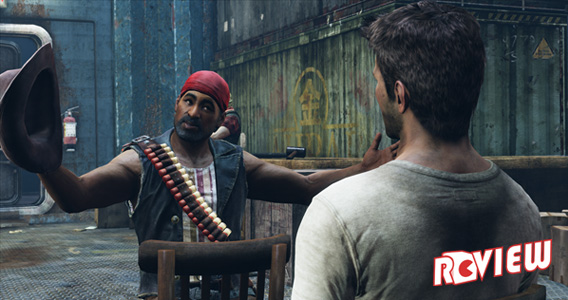
Today’s idiom of choice is the idea that if we all saw the world through rose colored glasses, society would enjoy an age of peaceful agreement for the wearing of them. Sure life would be tedious and boring in the absence of disagreement, but perhaps we’d accomplish more for the lack of arguments in that trippy hippy daze.
Philosophical detours aside, I’ve been thinking that a rosier tint might also assist me in playing Naughty Dog’s latest release in the Uncharted series the way they intended me to.
Over the last few days, I’ve watched Nathan Drake die a thousand deaths, all of them unnecessary if I’d only been capable of knowing exactly what the developer required of my admittedly awkward hands. As Nathan is chased across rooftops, there’s a very direct path toward the cinematic cut-scene I’m meant to reach, and dark suited adversaries do their best to herd me toward the point. But despite those efforts, I continually seem to make mistakes, take the wrong turn, plunge to my death or get caught for being too slow to deduce the way forward within the proper window of time. And this is problematic, because it breaks apart the cinematic flow of action in a game meant to be witnessed as an unbroken chain of seamless action sequences.
I can’t help feeling broken, like a child in the middle of a very important and carefully arranged production, underfoot and tripping up the performance. And it’s frustrating, I don’t want to ruin Naughty Dog’s shiny game, and I certainly don’t want to be driven into a corner where I must conclude that at times Uncharted 3 is the Dragon’s Lair of its day. That’s entirely too simplistic an appraisal of the work here, but there are occassions where I must repeat a sequence so many times over that such comparisons bear some fruit.
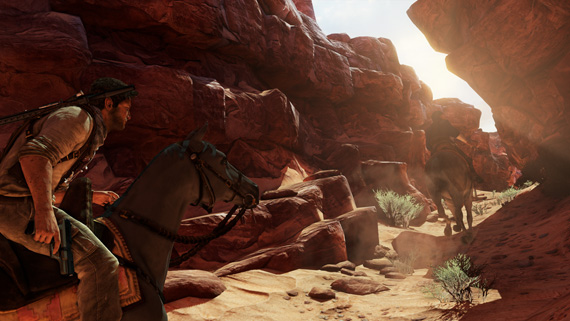
I’m not entirely interested in harping on the linear direction issued to the player, or complaining that the game often makes the player a mere passenger tapping buttons like a monkey to connect cinematic sequences. Such assessments are humorous at times, but also a tad dishonest, for while Uncharted 3 certainly runs players through a very narrow series of hoops to achieve its narrative goals, it never degrades into a series of button prompts allowing players to press X to win the game.
Uncharted 3’s narrow demands are a necessary evil that gamers accept for moments in which the pacing achieves harmony and flow, where the rollercoaster ride of events connects the escalating series of sequences, the cause and effect that spoils Nathan’s initial plans but quickly provides new alternatives rich with cliffhanger fantasies of clinging to airplanes, leaping from exploding boats, and working to escape a burning mansion as it crumbles.
Occasionally Naughty Dog offers set-pieces for the action that are wondrous beasts of twisted industrial design, playgrounds of detailed dilapidation, such as a graveyard of rotting boats or the chaotic interior of a sinking ocean liner. The game certainly delivers more standard battlefields, but with a palette of colors that seeks to remind the games industry that shades beyond brown and grey exist.
But insofar as refining the way players are directed through the chaos in a game with one very tightly controlled path to success, Uncharted wants for fresher ideas that don’t materialize here.
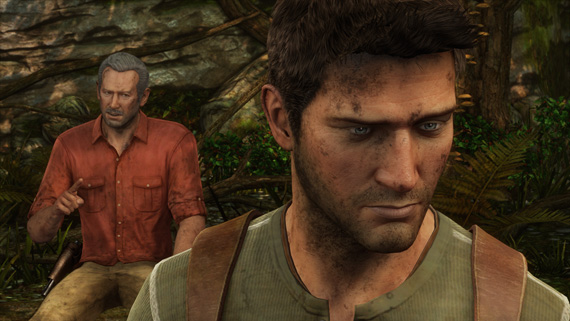
Uncharted 3 can survive and even find space to still thrive retreading the ground covered by Uncharted 2: Among Thieves – that critical and retail darling that makes “more of the same” an entirely acceptable state of affairs.
Uncharted has long garnered praise for the overall aims of its narrative, and particularly for characters that separate the series from other games, largely owing to their ability to emote, to say as much with words not spoken as those lines delivered between characters during cinematic sequences and within the game proper – convincing a certain level of humanity through writing that does more than simply react to the action driven gameplay. In short, Uncharted convinces players that there is an actual script that someone wrote with a semblance of enthusiasm.
Uncharted 3 offers warmth in the writing unfettered by genre obligated characters chained to template roles. That warmth comes through the camaraderie of characters, with lines that give me pause to chuckle at times, and through a strained romance that the script treats loose but carefully, recognizing the complex nature of it.
But the overall narrative hits a wall here in this latest outing, setting off on another adventure for the sake of doing so, because the adventure can never really end, and these characters can never really achieve resolution.
In a way I rather like that. Life is not so easily wrapped up in the final moments of an adventure. In many ways Nathan is simply trying to survive the events that unfold when he seeks to uncover Sir Francis Drake’s most guarded secret. Players are tossed all over the globe, and plans are continually derailed and readjusted in spectacular fashion. But then it’s difficult to understand the reckless obsession other characters accuse Nathan of possessing given that he is more often reacting to events, though I can sympathize with that condition and the point becomes muddled in the murky waters of life.
It’s the overall narrative that suffers most for want of reason, with a generic cast of villains seeking a rather vague goal, the inevitable finale never really providing insight, leaving a thin exploration of the relationship between Sully and Nathan as the primary justification for the trip.
That might be fine but for where Naughty Dog wants to get more poetic, where Nathan suffers some isolation and madness, but scrapes the bottom of the emotional barrel for material toward such ends. Wandering across a desert, compelled to look inward, no crucial character insights emerge. The same genre trappings that enable moments of narrative success can leave an empty feeling when one attempts to dig deeper than the source material can provide for. There is an emptiness to these characters, confined to their roles, chained to their shtick, and always better for setting off on another adventure than spending too much time contemplating their journey to date. It’s an element forgiven and overlooked in exchange for further adventures, and perhaps a bear Naughty Dog would be best not to poke.
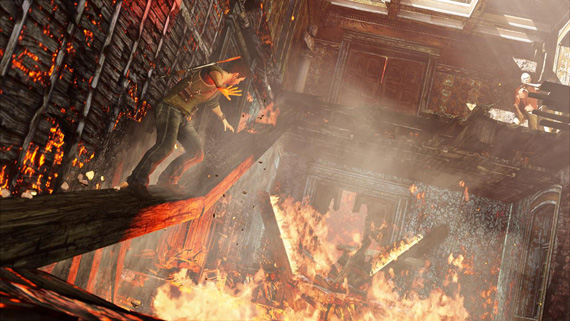
The puzzle-solving elements suffer a familiar simplicity, with ancient mysteries requiring players to either check a notebook offering the bulk of the solution, or use a codex that essentially shaves the challenge down to pressing X to solve a puzzle. This isn’t exclusive to Uncharted, with other recent releases such as Arkham City as guilty of simplifying puzzle solving elements in order to ensure the player is never intolerably stuck. But it’s curious that Naughty Dog is so concerned that the game will even offer to solve the puzzle before long, and yet the developer risks so many other bottleneck situations with chases sequences and a few key gunfights.
Playing with guns in Uncharted 3 remains a loose affair that focuses more on mobility and speed rather than grace and finesse. The variety of weapons and environments offer plenty of choice, presenting battlegrounds that never play out quite the same way for the amount of options and terrain available – though some tight rooms and frustrating deaths are unavoidable. Memorable battles owe plenty to the outright aggression of enemies, who utilize cover and the full arsenal of weapons on hand, but will also run up and eagerly slap Nathan in the face before unloading bullets into his chest at point blank range. But it is possible to continually switch strategies, using cover to carefully pick off enemies, and/or running and gunning opponents with heavy short range weapons.
Drake can engage enemies in fisticuffs, which relies on button prompts, not entirely unlike Arkham City, but certainly lacking the same smooth combo style and efficiency that makes those particular battles a dance. Drake’s fighting style is as loose and dirty as the gunplay, and best reserved for moments where picking a fight doesn’t leave one vulnerable to bullets from other adversaries not polite enough to wait their turn.
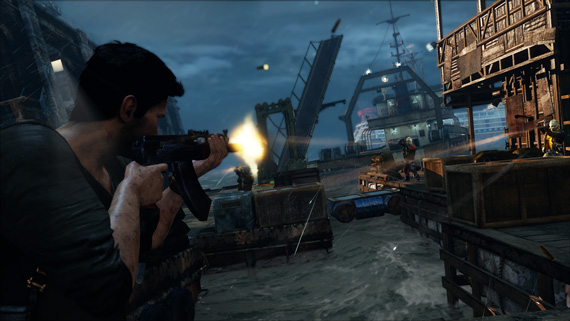
Stealth is an ideal alternative and opportunity to offer players even more choice, but is entirely undermined and undervalued within the game. If one enemy spots you, all enemies spot you, and suddenly possess the ability to know where you are forever after. It’s also the case that your supporting cast members will continually blow your cover by waltzing out into the line of sight while you work to stay concealed.
But I do love the situations that arise at times, even when I’m hesitant to enter a room that has grenade launchers on the floor, a clear signal that the fight ahead will be merciless. Enemy aggression encourages speed, reflex, and fast thinking – and every so often shooting an enemy at just the right time causes them to drop a live grenade, and the moment is a joyous one. That reminds me, this is the most grenade happy game in existence, and while players can often throw them back in time, this is yet another reason Nathan is encouraged to move from cover and frequently adapt strategy.
Guns and grenades lay the foundation for an increasingly robust suite of online multiplayer features, that range from team and all out death matches, to more objective based options like treasure hunting. Additional co-op story missions that can be played online or locally provide more insurance for longevity, as well as a natural fit for the episodic nature of Nathan’s lifestyle and profession.
As archaic and stiff as the gunplay can be, I’m hopelessly addicted to it. It’s the one real freedom in the game, though Naughty Dog does do their best to direct it as well, particularly when deciding when you can shoot and when environments are destructible. But every time a room or field of enemies is present, I feel engaged, constantly moving for the advantage, constantly changing weapons, constantly tossing back grenades, and constantly dying.
There are times these battles are infuriating, but I keep coming back for more, which leaves me wanting to compare Uncharted 3 to Modern Warfare for the way the online features no longer pad the release to justify the investment, but rather serve as the primary invitation.
Naughty Dog
Publisher
Sony Computer Entertainment
System
PlayStation 3
Modes
Singleplayer, Co-op (Splitscreen and Online), Online Multiplayer
Release Date
November 1, 2011
*A copy of this title was provided by the publisher for review
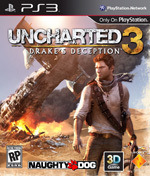
Huh, that’s a surprise. 7? I ALMOST bought it but since I hve yet to start UC2 I’ll wait for the GOTY edition.
Comment by EdEN — November 12, 2011 @ 8:07 am
Really? Some of my favorite games are 7’s.
Comment by Jamie Love — November 12, 2011 @ 1:49 pm
Oh, I’ve got games that got a 5-6 and that I enjoy. It was just interesting to see what many would call a “low score” for such a hyped game.
Comment by EdEN — November 12, 2011 @ 5:03 pm